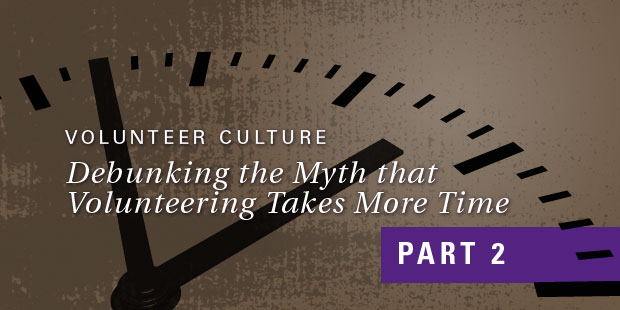
Volunteer Culture: Debunking the Myth that Volunteering Takes More Time – Part 2
In our local churches we sometimes operate in a fantasy land, ignoring the reality that our people are living outside the four walls of the church. We create programs, activities, and opportunities for people to volunteer their time and talent as though our people are sitting around with nothing to do.
When we do ask them to step up and participate, we’re often vague, and sometimes shaming.
It’s as though we think people walk through the front door of our church saying, “I want my life to count. I want to make a difference. Everything I’m doing now, I’ll stop to be involved here.” I wonder if we see a blank slate in the lives of our members and attendees and think it’s our job as pastors and staff to “fill ‘er up!” Really?
None of us really thinks that. We know better. But sometimes we don’t lead like we know better.
- The weekend bulletin/program is filled with a menu so large people are overwhelmed looking at it.
- We forget that people already have a full menu. They work jobs that already require more from them than they feel they can give. They are the taxi service to get kids to school, soccer practice, school games, dentist appointments, shopping and over-nighters. They have their own doctors’ appointments, gym schedule, cleaning and social lives. People are busy! Aren’t you?
- Then on top of that menu – not in place of it – we lay out an extensive array of opportunities for involvement. We tend to categorize the options: volunteer opportunities, Bible studies, group life, weekend services, etc. However, not all, but many people see the menu as a whole. “I can choose to volunteer, attend a class or be in a group. I can’t do everything.” Meanwhile the local church is communicating, “You need to be in a group, attend midweek classes, volunteer through a church ministry, be in the weekend service and spend time with your friends who need you to be Jesus in their lives. And don’t forget your family. Oh, and here’s one more all-church project we need everyone to prioritize.” Really? How’d we come to think people live a 9-day week?
- Trim. Trim. Trim. Here’s the simple truth: too many options on the menu means people won’t choose. It stresses them out. They’re paralyzed. Or they’ll choose and end up backing out. “Buyer’s” remorse.
- People can’t figure out how to volunteer.
- People want to help. They want to be involved. They want to make a significant contribution with their time and talent.
- If you want them to help, you’ll need to make onramps visible and easily accessible. Host a ministry fair, a volunteer expo. a VolunTour or Backstage Pass. Make a clear pathway through your website.
- The what – the task – is communicated without the why.
- I just wrapped up a lively lunch meeting with four men from our Elkhart campus. The focus was connecting new people. The foundational conviction was people must hear and embrace the vision to make a connection at all. All four of these men spoke from their own experience. The why behind the what at Granger Community hooked them. Knowing why, the what was easy.
- If people are going to give up time in the middle of their work day like these men did today; if they’re going to give time on the weekends; if they’re going to stay late and show up early – they deserve to know “why.” It informs and motivates the activity of serving.
Here’s the recap…
- Reduce the menu. Don’t overwhelm your people with too many choices.
- Make onramps to volunteering visible and easily accessible.
- Cast vision. Explain the why behind the what. Give context for the task.
Next post…
- Invest in people; don’t merely expect them to invest in your ministry.
_________________________
Of course, while you’re waiting for the next post, you should pick up THE handbook on all things volunteering by Tim Stevens and Tony Morgan: Simply Strategic Volunteers (also here).
And then, hop over to ENGAGED (Verb), the blog of Kim Volheim, our director of volunteer involvement at Granger Community.
Oh, and I did write more about this topic in Lasting Impressions (also here).
Read Part 1 here.
Read about Mark here.

Tags: Mark Waltz, Serve, Volunteer Culture












